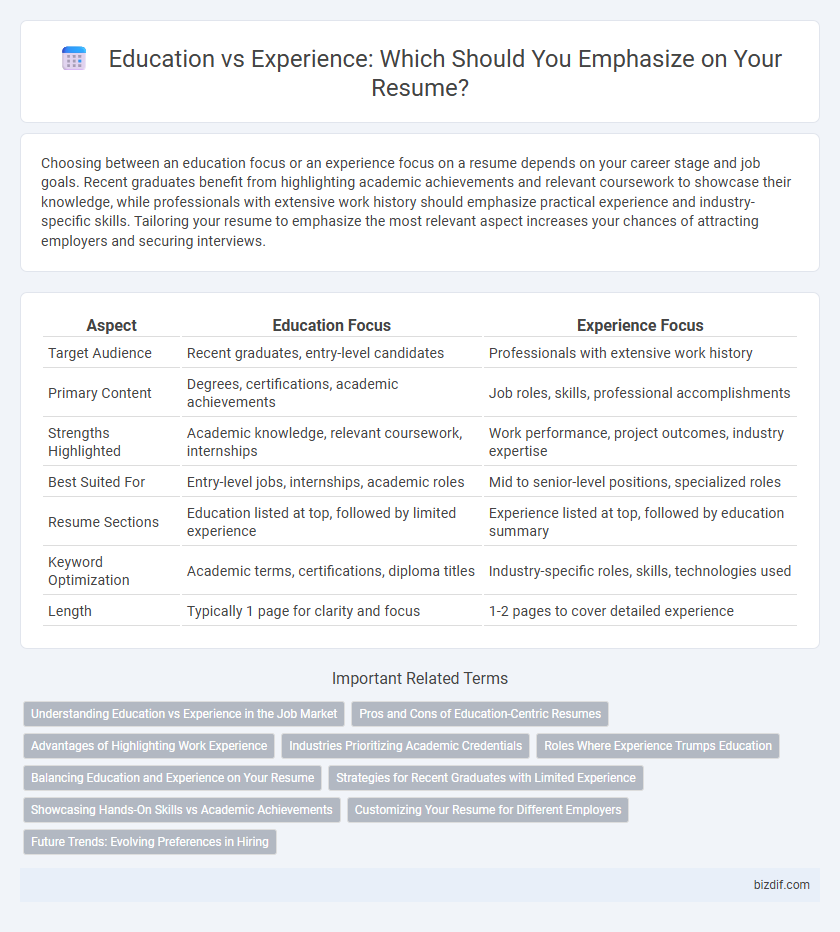Choosing between an education focus or an experience focus on a resume depends on your career stage and job goals. Recent graduates benefit from highlighting academic achievements and relevant coursework to showcase their knowledge, while professionals with extensive work history should emphasize practical experience and industry-specific skills. Tailoring your resume to emphasize the most relevant aspect increases your chances of attracting employers and securing interviews.
Table of Comparison
| Aspect | Education Focus | Experience Focus |
|---|---|---|
| Target Audience | Recent graduates, entry-level candidates | Professionals with extensive work history |
| Primary Content | Degrees, certifications, academic achievements | Job roles, skills, professional accomplishments |
| Strengths Highlighted | Academic knowledge, relevant coursework, internships | Work performance, project outcomes, industry expertise |
| Best Suited For | Entry-level jobs, internships, academic roles | Mid to senior-level positions, specialized roles |
| Resume Sections | Education listed at top, followed by limited experience | Experience listed at top, followed by education summary |
| Keyword Optimization | Academic terms, certifications, diploma titles | Industry-specific roles, skills, technologies used |
| Length | Typically 1 page for clarity and focus | 1-2 pages to cover detailed experience |
Understanding Education vs Experience in the Job Market
Employers often prioritize relevant experience over formal education when evaluating job candidates, as practical skills demonstrate immediate value. A resume emphasizing experience showcases hands-on accomplishments and problem-solving abilities directly applicable to the role. However, highlighting education can be crucial for entry-level positions or industries requiring specific certifications, balancing the resume's appeal across varied job market demands.
Pros and Cons of Education-Centric Resumes
Education-centric resumes highlight academic achievements, degrees, and relevant coursework, making them ideal for recent graduates or candidates transitioning careers with limited professional experience. This format underscores theoretical knowledge and certifications, which can appeal to employers seeking specific educational backgrounds, but may downplay practical skills and real-world accomplishments. A primary drawback is the potential perception of insufficient hands-on experience, which could disadvantage applicants in roles prioritizing demonstrated work history and applied expertise.
Advantages of Highlighting Work Experience
Highlighting work experience in a resume demonstrates practical skills and real-world accomplishments, making candidates more attractive to employers seeking immediate contributions. Emphasizing job history provides concrete evidence of problem-solving abilities, leadership, and industry knowledge often valued over academic credentials. This approach effectively showcases a candidate's proven performance and adaptability in professional environments.
Industries Prioritizing Academic Credentials
Industries such as healthcare, education, and engineering prioritize academic credentials by emphasizing degrees, certifications, and specialized training in resumes. Employers in these fields often require strict adherence to educational qualifications and accreditations to meet regulatory and professional standards. Highlighting relevant coursework, academic achievements, and certifications strengthens candidacy in sectors where formal education is a key hiring criterion.
Roles Where Experience Trumps Education
In industries such as technology, sales, and creative fields, practical experience and demonstrable skills often outweigh formal education when crafting a resume. Highlighting successful projects, leadership roles, and measurable achievements provides stronger evidence of capability than academic credentials alone. Employers prioritize candidates who showcase relevant hands-on experience that directly impacts their performance in the role.
Balancing Education and Experience on Your Resume
Balancing education and experience on your resume enhances your appeal to recruiters by showcasing both foundational knowledge and practical skills. Emphasize relevant coursework and certifications alongside quantifiable achievements and job responsibilities to create a comprehensive profile. Tailoring the balance based on the job description maximizes your resume's impact and aligns your qualifications with employer expectations.
Strategies for Recent Graduates with Limited Experience
Recent graduates with limited experience should emphasize their education by highlighting relevant coursework, academic achievements, and internships that demonstrate applicable skills. Structuring the resume to showcase projects, certifications, and volunteer work related to the target job increases visibility to employers seeking practical knowledge. Tailoring the resume with keywords from job descriptions enhances applicant tracking system (ATS) compatibility, improving the chances of being shortlisted.
Showcasing Hands-On Skills vs Academic Achievements
Highlighting hands-on skills in a resume emphasizes practical experience and problem-solving abilities, which are often more compelling to employers seeking candidates ready to contribute immediately. Showcasing academic achievements underscores theoretical knowledge and formal education milestones, appealing to roles that prioritize foundational expertise and credentials. Balancing both elements strategically can tailor a resume to align with specific job requirements and industry expectations.
Customizing Your Resume for Different Employers
Customizing your resume to highlight either education or experience depends on the employer's industry and job requirements, enhancing relevance and impact. For roles valuing academic achievements, emphasize degrees, certifications, and relevant coursework, while experience-focused resumes prioritize work history, skills, and accomplishments tailored to the job description. Strategic keyword inclusion from the job posting improves applicant tracking system (ATS) compatibility and increases the likelihood of securing an interview.
Future Trends: Evolving Preferences in Hiring
Employers increasingly value hybrid resumes that balance education focus with practical experience, reflecting evolving hiring trends. Emphasis on skills acquired through formal education combined with hands-on achievements demonstrates adaptability to future roles. Data-driven recruitment highlights candidates who showcase ongoing learning alongside relevant professional accomplishments.
Education Focus vs Experience Focus Infographic

 bizdif.com
bizdif.com